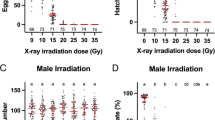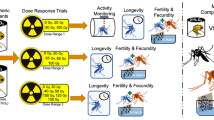Abstract
In many ways, management of the notorious vector mosquito, Aedes aegypti is difficult by conventional mosquito control measures. Sterile Insect Technique (SIT) by using irradiation can be considered as one of the environmentally benign alternatives. As radiation is deleterious to mosquito, therefore, careful studies are needed to select an optimal irradiation dose that will ensure the quality of irradiated males for field release. Hence, in this study we have attempted to determine the appropriate radiation dose that may satisfy the fitness qualities of irradiated male mosquito, Aedes aegypti for SIT applications. This study was conducted in laboratory conditions. Radiation doses of 40, 50, 60, and 70 Gy from Co60 irradiator were applied to 26-32 h old male pupae and subsequently, the radiation effects on pupal survivability, sterility, fertility, wing size, flight ability, adult longevity and mating competitiveness were assessed. Significant effect on sterility was observed in all the radiation doses studied which ranged between 98.97 ± 0.05 and 99.96 ± 0.02%. However, on average the sterility in the control group was found to be 28.81 ± 6.41%. This study did not observe any significant radiation effects on adult emergence, flight ability and wing size. But mean adult longevity was significantly affected by the radiation doses studied (P < 0.05). Fried index of mating competitiveness was 0.82 ± 0.05 at 60 Gy. The results of this study preliminary showed that the radiation dose of 60 Gy can be considered as the effective dose for achieving male sterility while keeping the male performances to a satisfactory level.








Similar content being viewed by others
Availibility of data and materials
Not applicable.
References
Abir T, Ekwudu O, Kalimullah NA, Nur-A Yazdani DM, Mamun AA, Basak P, Osuagwu UL, Yukthamarani Permarupan P, Milton AH, Talukder SH, Agho KE (2021) Dengue in Dhaka, Bangladesh: Hospital-based cross-sectional KAP assessment at Dhaka North and Dhaka South City Corporation area. PLoS One 16(3):e0249135. https://doi.org/10.1371/journal.pone.0249135
Ajayi I, Bellini R, Boireau P, Bradbury S, Bukachi SA, Ng LC, Jing F, Kittayapong P, Liedo P, Linthicum K (2020) Guidance framework for testing the sterile insect technique as a vector control tool against Aedes-borne diseases. World Health Organization and the Int Atomic Energy Agency. http://www.who.int/tdr/publications/year/2020/guidance-framework-for-testing-SIT/en/
Akter H, Khan SA (2014) Sensitivity of Immature Stages of Dengue Causing Mosquito , Aedes aegypti ( L .) to Gamma Radiation. J Entomol 11(2):56–67. https://doi.org/10.3923/je.2014.56.67
Alphey L, Benedict M, Bellini R, Clark GG, Dame DA, Service MW, Dobson SL (2010) Sterile-Insect Methods for Control of Mosquito-Borne Diseases: An Analysis. Vector-Borne and Zoo Dis 10(3):295–311. https://doi.org/10.1089=vbz.2009.0014
Anonymous (2020) Dengue fever claims 164 lives in Bangladesh in 2019. Xinhua. http://www.xinhuanet.com/english/2020-01/09/c_138691804.htm
Aziz MA, Gorham JR, Gregg MB (1967) “Dacca fever”-an outbreak of dengue. Pak J Med Res 6(2):83–92
Bakri A, Heather N, Hendrichs J, Ferris I (2014) Fifty Years of Radiation Biology in Entomology: Lessons Learned from IDIDAS. Ann Entomol Soc Am 98(1):1–12. http://www-ididas.iaea.org/ididas/
Bakri A, Mehta K, Lance DR (2005) Sterilizing insects with ionizing radiation. In Sterile Insect Technique: Principles and Practice in Area-Wide Integ Pest Manag (pp. 233–268). Springer Netherlands. https://doi.org/10.1007/1-4020-4051-2_9
Balestrino F, Medici A, Candini G, Carrieri M, MacCagnani B, Calvitti M, Maini S, Bellini R (2010) γ Ray dosimetry and mating capacity studies in the laboratory on Aedes albopictus males. J Med Entomol 47(4):581–591. https://doi.org/10.1603/ME09272
Bellini R, Balestrino F, Medici A, Gentile G, Veronesi R, Carrieri M (2013) Mating competitiveness of Aedes albopictus radio-sterilized males in large enclosures exposed to natural conditions. J Med Entomol 50(1):94–102. https://doi.org/10.1603/ME11058
Bellini R, Carrieri M, Balestrino F, Puggioli A, Malfacini M, Bouyer J (2021) Field Competitiveness of Aedes albopictus (Diptera: Culicidae) Irradiated Males in Pilot Sterile Insect Technique Trials in Northern Italy. J Med Entomol 58(2):807–813. https://doi.org/10.1093/jme/tjaa235
Bond JG, Aguirre-Ibáñez S, Osorio AR, Marina CF, Gómez-Simuta Y, Tamayo-Escobar R, Dor A, Liedo P, Carvalho DO, Williams T (2021) Sexual Competitiveness and Induced Egg Sterility by Aedes aegypti and Aedes albopictus Gamma-Irradiated Males: A Laboratory and Field Study in Mexico. Insects 12(2):1–17. https://doi.org/10.3390/insects12020145
Bond JG, Osorio AR, Avila N, Gómez-Simuta Y, Marina CF, Fernández-Salas I, Liedo P, Dor A, Carvalho DO, Bourtzis K, Williams T (2019) Optimization of irradiation dose to Aedes aegypti and Ae. albopictus in a sterile insect technique program. PLoS One 14(2):e0212520. https://doi.org/10.1371/journal.pone.0212520
Calkins CO, Parker AG (2005) Sterile insect quality. In: Dyck VA, Hendrichs J, Robinson AS (eds) Principles and Practice in Area-Wide Integrated Pest Management. Springer, pp 269–296
Carvalho DO, Torres-Monzon JA, Koskinioti P, Dilrukshi WNDA, Liang X, Pillwax G, Xi Z, Bourtzis K (2020) Aedes aegypti lines for combined sterile insect technique and incompatible insect technique applications: the importance of host genomic background. Entomol Exp Appl 168(6–7):560–572. https://doi.org/10.1111/eea.12892
Culbert NJ, Balestrino F, Dor A, Herranz GS, Yamada H, Wallner T, Bouyer J (2018) A Rapid Quality Control Test to Foster the Development of Genetic Control in Mosquitoes OPEN. https://doi.org/10.1038/s41598-018-34469-6
Deming R, Manrique-Saide P, Medina Barreiro A, Cardenã EUK, Che-Mendoza A, Jones B, Liebman K, Vizcaino L, Vazquez-Prokopec G, Lenhart A (2016) Spatial variation of insecticide resistance in the dengue vector Aedes aegypti presents unique vector control challenges. Parasit Vectors 9(1):67. https://doi.org/10.1186/s13071-016-1346-3
DGHS (Directorate General of Health Services). (2019). The latest information on dengue and suspected dengue patients in 2019. https://dghs.gov.bd/images/docs/Notice/2019/dengue/Dengue_20191231.pdf
Dyck VA, Hendrichs J, Robinson AS (2005) Sterile insect technique: Principles and practice in area-wide integrated pest management. Springer, Netherlands. https://doi.org/10.1007/1-4020-4051-2
Dyck VA, Hendrichs J, Robinson AS (2021) Sterile insect technique: Principles and practice in area-wide integrated pest management (2nd ed.). Taylor and Francis Group
Ernawan B, Tambunan USF, Sugoro I, Sasmita HI (2017) Effects of gamma irradiation dose-rate on sterile male Aedes aegypti. AIP Conf Proc 1854(June). https://doi.org/10.1063/1.4985401
Fried M (1971) Determination of Sterile-Insect Competitiveness. J Econ Entomol 64(4):869–872. https://doi.org/10.1093/jee/64.4.869
Hallinan E, Rai KS (1973) Radiation sterilization of Aedes aegypti in nitrogen and implications for sterile male technique. Nature 244(5415):368–369. https://doi.org/10.1038/244368a0
Hallman GJ (2003) Ionizing Irradiation Quarantine Treatment Against Plum Curculio (Coleoptera: Curculionidae). J Econ Entomol 96(5):1399–1404. https://doi.org/10.1603/0022-0493-96.5.1399
Helinski MEH, Parker AG, Knols BGJ (2006) Radiation-induced sterility for pupal and adult stages of the malaria mosquito Anopheles arabiensis. Malar J 5(1):41. https://doi.org/10.1186/1475-2875-5-41
Hendrichs J, Vreysen MJB, Enkerlin WR, Cayol JP (2005) Strategic Options in Using Sterile Insects for Area-Wide Integrated Pest Management. In V. A. Dyck, J. Hendrichs, & A. S. Robinson (Eds.), Sterile Insect Technique. Principles and Practice in Area-Wide Integrated Pest Manag (pp. 563–600). Springer
Hendrichs J, Wornoayporn V, Katsoyanos BI, Gaggl K (1992) First field assessment of the dispersal and survival of mass reared sterile Mediterranean fruit fly of an embryonal temperature sensitive genetic sexing strain. Management of Insect Pest: Nucl and Related Mole and Gen Tech 453–462. https://inis.iaea.org/search/search.aspx?orig_q=RN:25014567
Hossain MA, Khatun M, Arjumand F, Nisaluk A, Breiman RF (2003) Serologic Evidence of Dengue Infection before Onset of Epidemic. Bangladesh Emerging Infectious Diseases 9(11):1411–1414. https://doi.org/10.3201/eid0911.030117
Huang Y-JS, Higgs S, Vanlandingham DL (2017) Biological Control Strategies for Mosquito Vectors of Arboviruses. Insects 8(1):21. https://doi.org/10.3390/insects8010021
Knipling EF (1979) The basic principles of insect population suppression and management. (USDA Agriculture Handbook Number 512 (ed.); Issue 512). Sci and Education Admi. http://www.cabdirect.org/abstracts/19802902518.html;jsessionid=0EC1F778F57C8EC4D491233C863549B4
Lance DR, McInnis DO (2005) Biological basis of the sterile insect technique. In V. A. Dyck, J. Hendrichs, & A. S. Robinson (Eds.), Sterile Insect Technique: Principles and Practice in Area-Wide Integrated Pest Manag (pp. 70–94). Springer Netherlands. https://doi.org/10.1007/1-4020-4051-2_3
Lebon C, Soupapoule K, Wilkinson DA, Le Goff G, Damiens D, Gouagna LC (2018) Laboratory evaluation of the effects of sterilizing doses of γ-rays from Caesium-137 source on the daily flight activity and flight performance of Aedes albopictus males. PLoS One 13(8):e0202236. https://doi.org/10.1371/journal.pone.0202236
Lees RS, Gilles JR, Hendrichs J, Vreysen MJ, Bourtzis K (2015) Back to the future: the sterile insect technique against mosquito disease vectors. In Current Opinion in Insect Sci (Vol. 10, pp. 156–162). Elsevier Inc. https://doi.org/10.1016/j.cois.2015.05.011
Maïga H, Damiens D, Niang A, Sawadogo SP, Fatherhaman O, Lees RS, Roux O, Dabiré RK, Ouédraogo GA, Tripet F, Diabaté A, Gilles JRL (2014) Mating competitiveness of sterile male Anopheles coluzzii in large cages. Malar J 13(1):460. https://doi.org/10.1186/1475-2875-13-460
Mortuza MF, Lepore L, Khedkar K, Thangam S, Nahar A, Jamil HM, Bandi L, Alam MK (2018) Commissioning dosimetry and in situ dose mapping of a semi-industrial Cobalt-60 gamma-irradiation facility using Fricke and Ceric-cerous dosimetry system and comparison with Monte Carlo simulation data. Radiat Phys Chem 144:256–264. https://doi.org/10.1016/j.radphyschem.2017.08.022
Oliva CF, Jacquet M, Gilles J, Lemperiere G, Maquart PO, Quilici S, Schooneman F, Vreysen MJB, Boyer S (2012) The Sterile Insect Technique for Controlling Populations of Aedes albopictus (Diptera: Culicidae) on Reunion Island: Mating Vigour of Sterilized Males. PLoS One 7(11):e49414. https://doi.org/10.1371/journal.pone.0049414
Pan American Health Organization (2019) Evaluation of Innovative Strategies for Aedes aegypti Control: Challenges for their Intro and Impact Assesd. https://iris.paho.org/handle/10665.2/51375
Parker A, Mehta K (2007) Sterile insect technique: A model for dose optimization for improved sterile insect quality. Florida Entomologist 90(1):88–95. https://doi.org/10.1653/0015-4040(2007)90[88:SITAMF]2.0.CO;2
Ramadhani T, Hadi UK, Soviana S, Irawati Z, Rahayu A, Sunaryo PA, Mallongi A (2019) Effects of gamma irradiation against mating competitiveness of male Culex quinquefasciatus (diptera:culicidae) in laboratory. BioRxiv. https://doi.org/10.1101/727198
Shetty V, Shetty NJ, Ananthanarayana SR, Jha SK, Chaubey RC (2017) Evaluation of gamma radiation-induced DNA damage in Aedes aegypti using the comet assay. Toxicol Ind Health 33(12):930–937. https://doi.org/10.1177/0748233717733599
Shetty V, Shetty NJ, Harini BP, Ananthanarayana SR, Jha SK, Chaubey RC (2016) Effect of gamma radiation on life history traits of Aedes aegypti (L.). Parasite Epidemiol Control 1(2):26–35. https://doi.org/10.1016/j.parepi.2016.02.007
Terzian LA, Stahler N (1958) A study of some effects of gamma radiation on the adults and eggs of Aedes aegypti. Biol Bull 115(3):536–550. https://doi.org/10.2307/1539116
Tur C, Almenar D, Benlloch-Navarro S, Argilés-Herrero R, Zacarés M, Dalmau V, Pla I (2021) Sterile Insect Technique in an Integrated Vector Management Program against Tiger Mosquito Aedes albopictus in the Valencia Region (Spain): Operating Procedures and Quality Control Parameters. Insects 12(3):272–295. https://doi.org/10.3390/insects12030272
Weaver SC, Reisen WK (2010) Present and future arboviral threats. Antiviral Res 85(2):328–345. https://doi.org/10.1016/j.antiviral.2009.10.008
WHO (2012) Treatment, prevention and control global strategy for dengue prevention and control 2. World Health Organization. https://apps.who.int/iris/bitstream/handle/10665/75303/9789241504034_eng.pdf
Zhang D, Lees RS, Xi Z, Gilles JRL, Bourtzis K (2015) Combining the Sterile Insect Technique with Wolbachia-Based Approaches: II-A Safer Approach to Aedes albopictus Population Suppression Programmes, Designed to Minimize the Consequences of Inadvertent Female Release. PLoS One 10(8):e0135194. https://doi.org/10.1371/journal.pone.0135194
Acknowledgements
This research work was supported by the International Atomic Energy Agency (CRP D44004), contract number 23909. The authors would like to thank Mr. Md. Abdus Salam, Senior Scientific Assistant, Insect Biotechnology Division, Institute of Food and Radiation Biology for his profound endeavor in this study. They also would like to extend special thanks to Mr. Md. Khalid Hossain, Senior Technician, Gamma Source Division, Institute of Food and Radiation Biology for his help during the irradiation process.
Funding
Not applicable.
Author information
Authors and Affiliations
Corresponding author
Ethics declarations
Ethics approval and consent to participate
Not applicable.
Consent for publication
Not applicable.
Conflict of interests
The authors declare that they have no conflict of interests.
Additional information
Publisher's Note
Springer Nature remains neutral with regard to jurisdictional claims in published maps and institutional affiliations.
Rights and permissions
About this article
Cite this article
Hossain, M.F., Ghosh, A., Sultana, N. et al. Optimization of irradiation sterility dose of the male Aedes aegypti (Linnaeus) Mosquito: A laboratory study in Bangladesh. Int J Trop Insect Sci 42, 1421–1428 (2022). https://doi.org/10.1007/s42690-021-00658-6
Received:
Accepted:
Published:
Issue Date:
DOI: https://doi.org/10.1007/s42690-021-00658-6




